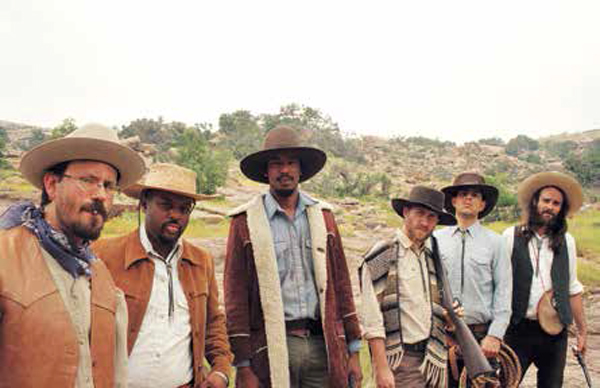At Work: Black Joe Lewis

Black Joe Lewis & The Honeybears seemed poised for success. They even had a rather fantabulous origin story: Austin-based singer Joe Lewis decided to form a band with Zach Ernst after the then-University of Texas student booked Lewis to open for Little Richard. They recruited band members, dressed in sharkskin suits like the pre-Beatles Temptations and perfected a messy mix of swaggering screamo-soul. Al Green refused to tour with them because he found the title of one of their songs offensive, which gave them a certain kind of notoriety, while Britt Daniel demanded that they open for Spoon, which gave them another.
They released three well-received albums, toured relentlessly and secured opening spots for New York Dolls, Okkervil River and Barack Obama. Throughout, they attracted a rather eclectic fan base. But that was the problem: Listeners ranged from those who saw them as soul revivalists to those who liked the more deranged and garage-y aspects of their show.
“Some of the songs had a beat kind of like hip-hop, but our attitude was always more punk rock,” Lewis confesses.
At heart, Lewis saw himself as a descendent of The Stooges rather than James Brown, despite his claim that a documentary on the Godfather of Soul inspired his agitated vocal shout. And while he may look like the reincarnation of Elmore James, the 32-year-old singer is much more audacious in his musical tastes than those early albums would lead you to believe. Over time, he felt the need to express that inner Iggy, much to the discontent of some of his band members.
The group signed to a new label, dropped Honeybears from their name, hired a new producer, put the suits in a back closet, and Ernst and drummer Matthew Strmiska left in a cloud of controversy. Now merely billed as Black Joe Lewis, the retooled band released Electric Slave in 2013, revealing a harder, more unhinged vision and songs that are far more personal and confrontational than anything they’ve done before.
“We didn’t really change; we just went back to what I used to do before the Honeybears,” quips Lewis. “We had some band members that had their own idea about stuff. So it was a constant battle trying to get it right. Now they’re all gone and we can focus on music and not fighting. The split was the best thing that happened to this band. I’m not really allowed to go into detail but trust me, I’d love to.”



















